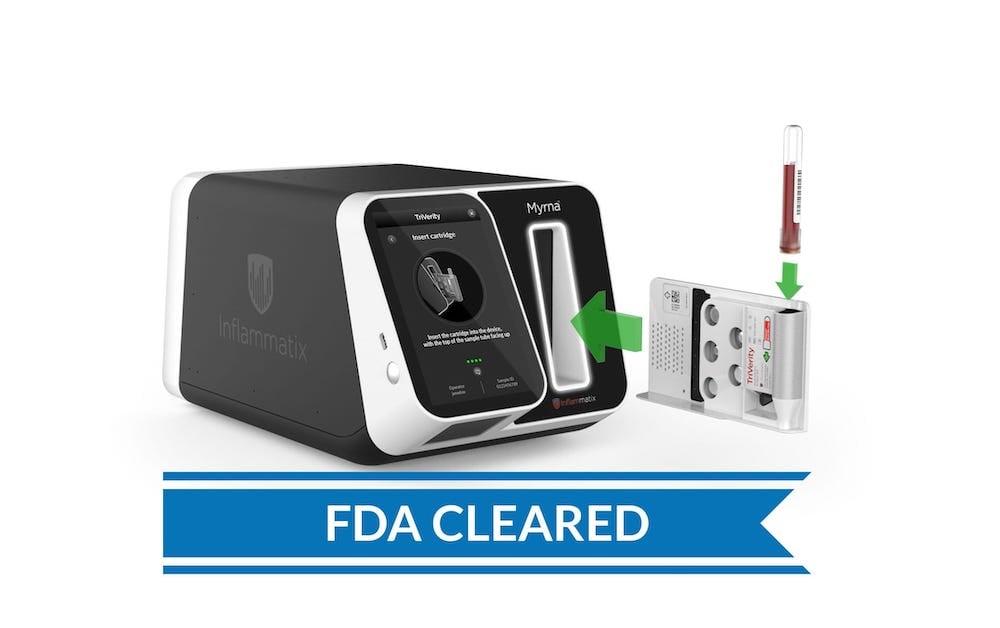Summary: Inflammatix’s FDA-cleared TriVerity Test System provides accurate infection likelihood and illness severity assessments for the management of sepsis and acute infections.
Takeaways:
- New Technology: TriVerity measures 29 immune response-related genes and uses AI to deliver three precise scores indicating bacterial or viral infection likelihood and risk of severe illness, addressing the limitations of traditional sepsis diagnostics.
- Streamlining Emergency Care: By enabling faster and more accurate triage of patients with suspected sepsis or acute infections, TriVerity aims to reduce emergency department overcrowding, unnecessary hospital admissions, and clinician burnout.
- Backed by Rigorous Validation: FDA clearance was based on the SEPSIS-SHIELD study, demonstrating high diagnostic accuracy across diverse patient populations, solidifying TriVerity’s potential to improve survival rates and healthcare efficiency.
Inflammatix, a host response diagnostics company, announced that the U.S. Food and Drug Administration (FDA) granted marketing authorization for the TriVerity Test System (TriVerity), a molecular test for patients with suspected acute infection or sepsis.
Improving Sepsis Diagnostics
Using precise measurements of a patient’s immune response, TriVerity combines highly accurate bacterial-viral infection scoring with an all-cause illness severity risk evaluation, giving clinicians a rapid and holistic snapshot of a patient’s status.
“Despite billions of dollars’ worth of innovation and decades of work, sepsis mortality remains frustratingly high, and sepsis remains the most expensive diagnosis to the healthcare system,” says Tim Sweeney, MD, PhD, CEO and co-founder of Inflammatix. “The fundamental problem with existing tests is an outdated focus on labeling patients as ‘septic or not.’ But sepsis is a syndrome, not a disease, and its definition keeps changing. We therefore designed TriVerity to look at its clinically actionable core elements: (1) does this patient have an infection, and (2) how sick are they likely to become?”
Dr. Sweeney added, “When troponin monitoring came into mainstream practice, it transformed the syndrome of ‘chest pain,’ and outcomes for heart attacks improved dramatically. We think that syndromic acute infections are ready for a similar revolution in care, led by TriVerity.”
What is the TriVerity Rapid Blood Test?
TriVerity is a rapid blood test that measures the expression levels of 29 genes associated with the host immune response to infection. The test uses validated algorithms developed applying artificial intelligence (AI)/machine learning to interpret the host response information into three scores that indicate the likelihood of bacterial infection, viral infection, and severe illness (as defined by the need for mechanical ventilation, vasopressors, or renal replacement therapy within seven days).
Easing Burden for Emergency Departments
TriVerity is expected to ease the burden faced by hospital systems, which are plagued by emergency department (ED) overcrowding, and, for those patients admitted, with lengths of stay (LOS) commonly measured not in hours but in days or even weeks.(1) A large part of the problem is that for every patient identified with sepsis, typically 20 patients must be screened or tested.(2) Faster, more accurate triage of this patient segment may dramatically decrease resource strain, reduce unnecessary hospital admissions and LOS, and free up clinicians to focus on patients who truly need critical interventions.
That is the gap TriVerity aims to close: by providing a precise measure of infection likelihood and risk stratification (instead of defaulting to a binary “sepsis” label), it helps EDs manage not just patients with sepsis, but also those with common acute infection presentations such as suspected pneumonia, cellulitis, or other infections. The long-term goal is to improve outcomes, survival rates, and healthcare utilization for a broad group of patients.
“FDA clearance of TriVerity comes at an opportune time for today’s overburdened emergency physicians, who now have a precise and reliable tool to facilitate the diagnosis and proper management of acute infections or sepsis,” says John W. Hafner, MD, emergency medicine physician at OSF HealthCare and program director, research director, and clinical professor of Emergency Medicine at the University of Illinois College of Medicine in Peoria. “In addition to identifying patients whose severe infections might otherwise have been missed, TriVerity can help quickly triage patients in the ‘grey zone,’ whose signs and symptoms are ambiguous and hard to diagnose.”
The FDA cleared TriVerity based on results from the SEPSIS-SHIELD study (NCT04094818), in which TriVerity yielded diagnostic and prognostic results with a high degree of accuracy in 1,222 enrolled patients across 22 sites, regardless of patients’ immune status or race. The FDA previously granted Breakthrough Device Designation to TriVerity in November 2023. FDA clearance of TriVerity is particularly notable, with only about 10% of designated Breakthrough Devices receiving marketing clearance.(3)
Hal Paz of Khosla Ventures, a lead investor in Inflammatix, commented, “As a former CEO of multiple large-scale health systems, I’ve seen how slow or inaccurate sepsis diagnosis harms patient care, drives up costs, and contributes to clinician burnout. TriVerity transforms that equation by reducing diagnostic uncertainty, streamlining care, lowering costs, and most importantly improving patient outcomes.”
Further Reading
“TriVerity is a first step towards accurate molecular characterization of acute illnesses,” noted Inflammatix Co-founder and Chief Scientist Purvesh Khatri, PhD, who is also Professor of Medicine at Stanford University. “Its unprecedented accuracy is the result of over a decade of rigorous state-of-the-art data science. We were able to integrate thousands of patient profiles into a set of robust classifiers and were thrilled that the accuracy was exactly in line with our expectations. Our combination of rapid, high-multiplex test results with data-driven insights will usher in the era of precision medicine for critical illnesses in which the immune host response is the determining factor in individualizing care for every patient walking into the emergency department.”
References
- American College of Emergency Physicians. Emergency Department Boarding Crisis Sign-on Letter, November 7, 2022. https://www.acep.org/siteassets/new-pdfs/advocacy/emergency-department-boarding-crisis-sign-on-letter-11.07.22.pdf.
- Wang HE, Jones AR, Donnelly JP. Revised National Estimates of Emergency Department Visits for Sepsis in the United States. Crit Care Med. 2017;45(9):1443-1449. doi: 10.1097/CCM.0000000000002538.
- U.S. Food and Drug Administration. Breakthrough Devices Program, November 7, 2024. https://www.fda.gov/medical-devices/how-study-and-market-your-device/breakthrough-devices-program#:~:text=Graph%202:%20Number%20of%20Granted,ABBOTT%20MEDICAL.





